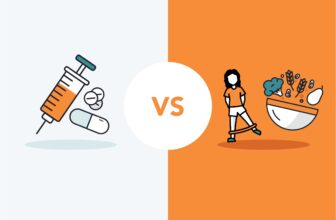How to Increase Immunity?

Body immunity system helps you to fights against illness. By increasing your immunity, you body get naturally strengthen to defense against many types of illness: include common flue, cough, fever etc.
Overall, your immune system does an outstanding job of protecting you from disease-causing by germs. But occasionally it neglects the germ and you will ill.
You can easily improve your body immunity system, By adding some healthy food in your daily routing and making small change in your lifestyle you may improve your immunity system naturally.
Note: Increasing your immunity system is not that mean you will not get sick, but it helps your body to protect you for sickness as long as possible. The tips outlined below will help to improve your immune health system, but it’s did not protect specifically against COVID-19 (Coronavirus).
In this article we have listed some healthy diet food and some small lifestyle tips to increase your immunity system naturally.
Exercise regularly
Exercise helps reduce your chances of developing cardiovascular disease. Additionally, it keeps your bones strong and healthy. Exercise improves your immunity system to fight against certain diseases.
Physical Activity might help flush bacteria from the airways and lungs. This may lower your probability of having a cold, flu, or other disease.
Also Read: 6 Top Habits of Super Learners
Exercise WBCs are the human body’s immune system cells which fight infection. These Compounds or WBCs circulate rapidly, so that they can detect disorders earlier than they could have previously. But, nobody knows if these modifications help prevent illnesses.
The short Increase in body temperature during and shortly after exercise can prevent germs from growing. This temperature increase can help the body fight disease better. (This is very similar to what occurs whenever you’ve got a fever)
Exercise slows the release of hormones. Some stress raises the prospect of disease. Reduced stress hormones can protect against disease.
Exercise is great for you; however, you shouldn’t overdo it. Individuals who exercise shouldn’t exercise just to maximize their resistance.
Studies have Shown that individuals who follow a reasonably lively way of life. Exercise makes you feel fitter and more energetic. Additionally, it can help you feel much better about yourself.
Also Read: Habits of Truly Intelligent People
Meditation
Meditation improves the immune system, reduces blood pressure and even sharpens the mind, according to research. The practice an essential part of Indian Yoga traditions has entered the mainstream as people try to find ways to combat stress and improve their quality of life.
Yoga
Yoga not only relaxes the body and mind, but certain poses of yoga also release congestion and enhance overall well-being. Relaxation and stress reduction have actually been linked to a stronger immune system.
Some of the Popular Yoga Poses for Improve Immunity System are:
- Shishuasana
- Setu Bandhasana
- Halasana
- Bhujangasana
- Dhanurasana
- Matsyasana
Also Read: Incredible Benefits of Papaya Leaf Juice
Add More Fruits and Green Vegetables in Your Daily Diet
Foods like fruits, green vegetable, nuts, seeds, and legumes are rich in nutrients and antioxidants that may give you an upper hand against harmful pathogens.
The antioxidants in these foods help decrease inflammation by combating unstable compounds called free radicals, which can cause inflammation when they build up in your body in high levels.
Chronic inflammation is linked to numerous health conditions, including heart disease, Alzheimer’s, and certain cancers.
Meanwhile, the fiber in plant foods feeds your gut microbiome, or the community of healthy bacteria in your gut. A robust gut microbiome can improve your immunity and help keep harmful pathogens from entering your body via your digestive tract.
Furthermore, fruits and vegetables are rich in nutrients like vitamin C, which may reduce the duration of the common cold.
Also Read: How To Develop World Class Behaviors Skills?
Get enough sleep
Sleep and immunity are tightly tied. Insufficient sleep might raise your chance of getting ill. Insufficient or poor excellent sleep is connected to a greater susceptibility to illness.
In a research at 164 healthy adults, people who slept fewer than 6 hours per night were likely to grab a cold than people that slept 6 hours or more every night.
Getting adequate rest can strengthen your normal immunity. Additionally, you might sleep longer when ill to permit your immune system to fight the illness.
Adults should plan to have 7 or more hours of sleep per day Night, while teenagers want 8–10 hours along with younger kids and babies around 14 hours.
If you are having trouble sleeping, try restricting display time For one hour before bed, even because the blue light generated in the mobile, TV, and personal computer can interrupt your circadian rhythm, or the human own body’s normal wake-sleep cycle.
Other sleep hygiene suggestions contain sleeping in a totally Darkened room or having a sleeping mask, moving to bed at precisely the exact same time nightly, and Exercising frequently.
Also Read: 5 Extraordinary Benefits of Lemon for Your Health
Limit Sugars Use
Emerging research suggests that added sugars and refined carbs may contribute disproportionately to overweight and obesity (16Trusted Source, 17Trusted Source).
Obesity may likewise increase your risk of getting sick.
According to an observational study in around 1,000 people, people with obesity who were administered the flu vaccine were twice as likely to still get the flu as individuals without obesity who received the vaccine.
Curbing your sugar intake can decrease inflammation and aid weight loss, thus reducing your risk of chronic health conditions like type 2 diabetes and heart disease.
Also Read: 6 Super Drinks that Naturally Cleanse Your Liver.
Given that obesity, type 2 diabetes, and heart disease can all weaken your immune system, limiting added sugars is an important part of an immune-boosting diet.
You should strive to limit your sugar intake to less than 5% of your daily calories. This equals about 2 tablespoons (25 grams) of sugar for someone on a 2,000-calorie diet.





